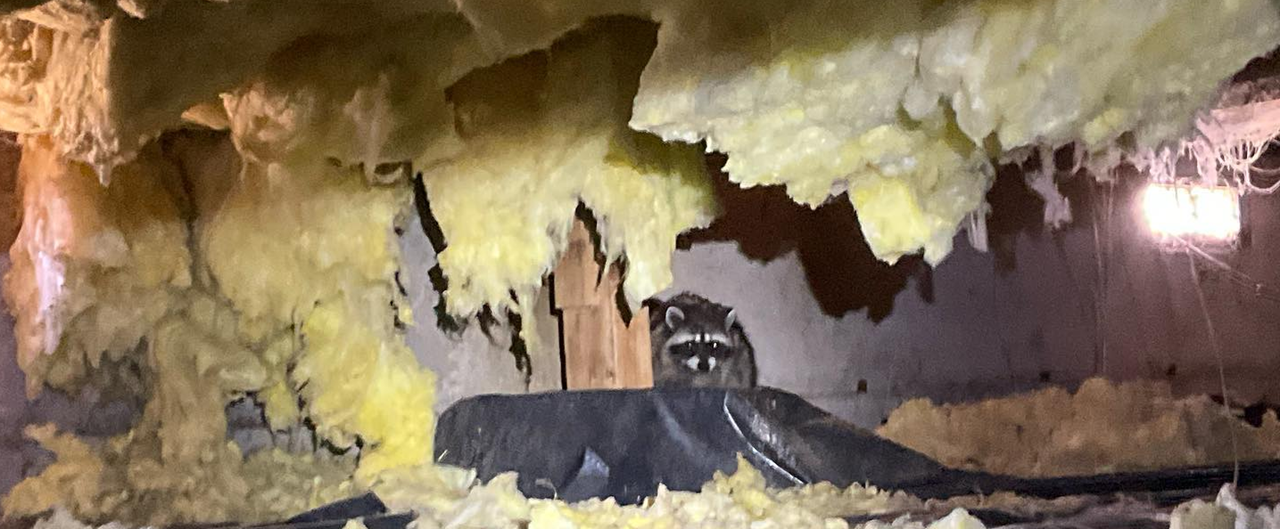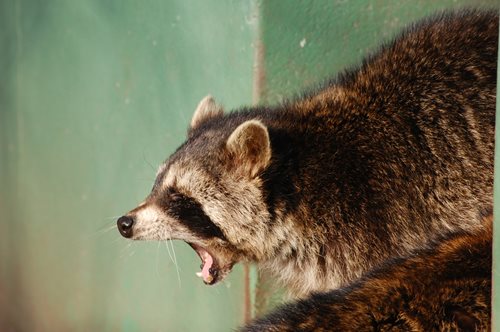
Hearing strange noises at night?
You may be sharing your home with raccoons. Listen, compare, and learn what to do next.
What Do Raccoons Sound Like at Night?
9 Common Raccoon Vocal Sounds
Raccoon sounds range from their vocal calls to the noises made by rustling, scurrying, and other activities. Extremely vocal, raccoons use over 200 sounds to interact, including purring, chittering, growling, snarling, hissing, whimpering, and owl-like screeches. Baby raccoons often mew, cry, or whine.
Chitter
A high-pitched call that sounds like a bird.
Growl
A low growl when feeling threatened.
Chirp
When kits are hungry or calling mom.
Hiss
A raccoon hisses when angry or alarmed.
Grunt
Grunts can be a way to say hello, show submission, or express fear.
Purring
A rhythmic churr-churr when feeling safe, nursing, or happy.
Trill
A high-pitched call heard a mile away, to warn or attract other raccoons.
Juvenile Noises
A rhythmic churr-churr is the communication between mother and juveniles.
Movement Noises
You will hear raccoons moving in your attic or walls.
You will hear raccoons in the attic. Raccoons can weigh as much as twenty pounds. Combined with an average litter size of three to seven kits, raccoons will make noises in your attic.
Yes, raccoons make noises on your roof. Typical raccoon sounds also occur when the pests walk across rooftops, construct their dens, or attempt to gain entry through holes or other small openings that lead to attractive denning sites.
Raccoons are noisy! They can make over 200 vocalizations like growling, hissing, snarling, screaming, screeching, purring, chirping, mewing, whistling, and whining. If you have a raccoon in the attic, you will hear sounds like scratching, rustling, thumping, gnawing, or scurrying.
Homeowners will mostly hear raccoon noises at night, when the pests are most active in their search for food. As such, residents may be awoken by the sounds of raccoons knocking over or rummaging through trash cans. Individuals may also hear raccoon sounds from inside homes, like the pests rustling or scratching between walls.
Raccoon kits make their distinct sounds like chittering, chippering, mewing, crying, and whining. You might mistake their sounds for birds chirping simultaneously. When they feel threatened or annoyed, the raccoon kits make a high-pitched chirping noise.
Yes, raccoons can be dangerous, especially if kits are present, or they feel cornered or threatened. They have sharp claws and teeth, which they will use to defend themselves. Raccoons are one of the leading rabies vector animals in North America. Beyond that, a raccoon in the house will cause damage, contiminate the area, and spread diseases.
Yes, raccoons are nocturnal. But you might see a female active in the day if she needs to get food for her young.
Raccoons live in every state and can survive in a variety of habitats. Raccoons can live under your deck, shed, or in a tree hollow on your property. They will also create dens inside attics, walls, and crawlspaces.
Raccoon Vocal Noises
Raccoon sounds range from the vocalizations the animals use to communicate with each other to the noises they make as a result of their rustling, scurrying, and other activity. Known to be extremely vocal creatures, raccoons interact by using more than 200 different sounds, which include purring, chittering, growling, snarling, hissing, whimpering, and even screeching like owls. Baby raccoon sounds include mewing, crying, and whining.
Raccoon Movement Noise
Even when raccoons are quiet vocally, they still make noise. The sound of an animal rustling or scurrying about the attic or in the chimney is a common sign that a raccoon has moved in. Typical raccoon sounds also occur when the pests walk across rooftops, construct their dens, or attempt to gain entry through holes or other small openings that lead to attractive denning sites. People tend to hear raccoon sounds most frequently at night due to the nocturnal behavior of the pests.
What Noises Do Raccoons Make at Night?
Homeowners will mostly hear raccoon noises at night, when the pests are most active in their search for food. As such, residents may be awoken by the sounds of raccoons knocking over or rummaging through trash cans. Individuals may also hear raccoon sounds from inside homes, like the pests rustling or scratching in between walls.
Home Invaders
Attracted by the presence of food and access to suitable denning sites, raccoons are common invaders of homes. They take advantage of holes and other structural openings to get inside. Common entry points and denning sites include attics, chimneys, and the open spaces beneath porches, sheds, and houses. Even though raccoons build their dens in places where it may be difficult to detect the pests by sight, they often make sounds and noises that reveal their presence in the home.
When raccoon sounds lead to discovering an infestation problem, professional raccoon control is usually necessary. Raccoons will defend themselves when cornered and may become aggressive. They can also carry diseases, including rabies and canine distemper. To prevent the risk of injury or disease, contact a wildlife removal professional if you hear raccoon sounds in your home.
Contact Form
- How to Get Rid of Raccoons
- Are Raccoons Dangerous?
- Raccoon Trapping Service
- Raccoon Control
- Baby Raccoons
- Dead Raccoon Removal
- Raccoon Diseases
- Do Raccoons Hibernate in Winter?
- Raccoon Damage
- Raccoon Diet
- Raccoon Poop
- Raccoons In Yards
- Raccoons in Basements
- Raccoons in Chimneys
- Raccoons in Crawl Spaces
- Raccoons in Houses
- Raccoons in Trash
- Raccoons in Trees
- Raccoons in Walls
- Raccoons on Roofs & in Soffits
- Raccoon Tracks
- Raccoons in Attics & Ceilings
- What Does a Raccoon Look Like?



